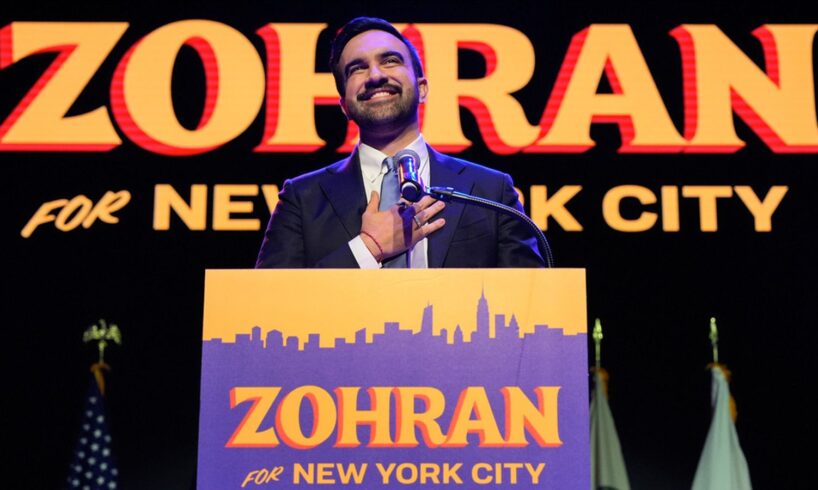
Elevenlabs AudioNative Player
Zohran Mamdani speaks during a victory speech at a mayoral election night watch party, Tuesday, Nov. 4, 2025, in New York. [AP Photo/Yuki Iwamura]
The victory of Democratic Socialists of America (DSA) member Zohran Mamdani in the New York City mayoral election—a self-proclaimed “democratic socialist” winning in the home of Wall Street, the center of American and global finance capital—is an event of national and indeed international significance.
The election explodes the narrative that any alternative to capitalism is off limits to a population subjected to decades of anticommunism and antisocialism. In reality, the movement of broad sections of workers and youth is to the left, with growing hostility to capitalism and increasing support for socialism. The vote for Mamdani expresses not only disillusionment with the existing political establishment but outrage over the vast concentration of wealth in the hands of a tiny elite, the crushing cost of living and the decay of basic democratic and social rights.
More than 1 million people voted for Mamdani, amid the highest voter turnout in decades: over 2 million ballots were cast, double the total from four years ago and the most since 1969. Mamdani, who was polling at only 1 percent when he began his campaign in the primary elections, won a clear majority in the three-way race, defeating his nearest rival, Democratic ex-Governor Andrew Cuomo, by 9 percentage points.
Mamdani carried most of the working class areas across New York City’s five boroughs, winning by overwhelming margins in districts hardest hit by inequality and rising living costs. He defeated Cuomo by 45 percentage points in Harlem, 28 points in Jamaica, Queens, 28 points in East New York, Brooklyn, and 27 points in Parkchester, Bronx—some of the most impoverished and racially diverse neighborhoods in the city.
Seventy percent of voters under 45 supported him, compared to just 25 percent for Cuomo, according to CNN’s exit poll. He won overwhelmingly among those who described their family’s financial situation as “falling behind” and among those who strongly oppose Trump and his fascistic agenda.
The election was a clear repudiation of the political establishment—both the far-right Republicans and the Democratic Party machine—which backed Cuomo and poured over $50 million in dark money into his campaign. Mamdani’s focus on the soaring cost of living, including for rent, childcare and groceries, resonated, as did his rhetorical denunciations of the oligarchs who dominate political and economic life and are rallying behind Trump’s developing dictatorship.
No doubt Mamdani’s election has generated enthusiasm, not only in the United States but internationally. The contrast between Andrew Cuomo—the scion of the Democratic Party establishment, steeped in corruption—and Mamdani, who presents himself as a champion of the oppressed, will encourage illusions that a fundamental change is underway. Yet it is necessary to state certain basic truths, not adapt to illusions, but proceed from the logic of political and social reality.
First of all, it must be said that while he presents himself as a “democratic socialist,” Mamdani is not advancing a socialist program. His proposals—slight tax increases on millionaires, limited rent protections and modest expansions of public services—amount to little more than a mild revival of the liberal reformism of an earlier period.
However, even the most modest proposals will confront the ferocious resistance of Wall Street, the corporate-financial oligarchy, and the state apparatus that defends their interests, in the form of lawsuits, political provocations or more direct action. The financial aristocracy is not about to concede anything. It will resist, with all the means at its disposal, even the slightest encroachment on its wealth and power.
The Trump administration, acting as the political representative of the financial oligarchy, has already responded to Mamdani’s victory by escalating its threats and signaling a readiness to intervene directly in New York City. In an interview with Fox News following Mamdani’s call in his victory speech to “turn up the volume” against Trump, the president warned, “It’s a very dangerous statement for him to make. You talk about danger—I think it’s a very dangerous statement for him to make. He has to be a little bit respectful of Washington.”
Trump’s fascist adviser Steve Bannon likewise told Politico that Mamdani’s election “should be a wake-up call,” adding that “there should be flashing red lights all over.” Bannon declared, “These are very serious people, and they need to be addressed seriously,” before demanding that Mamdani, a US citizen born in Uganda, be deported.
The Socialist Equality Party will oppose these and all other attacks, including the likely deployment of National Guard or other military forces to New York City. However, we will not subordinate our politics to Mamdani and the Democratic Party.
The Democratic Party, of which Mamdani is a member, is itself absolutely opposed to any challenge to the wealth and domination of the financial elite. Leading Democrats are divided between a faction that is willing to work with Mamdani, recognizing the party’s need for a candidate who can make a broad appeal, and a faction which fears that cultivating anti-establishment sentiments could quickly slip out of its control.
Many leading Democrats, including Senate Minority Leader Chuck Schumer, refused to endorse Mamdani even after his primary victory. The media mouthpiece of the Democratic Party, the New York Times, published a lengthy editorial Wednesday setting parameters for the new mayor. The editors effectively demanded that Mamdani abandon his campaign promises and govern along the lines of billionaire former Mayor Michael Bloomberg, whom Mamdani himself had unsuccessfully sought to court.
The editorial emphasized the need for Mamdani to assemble a cabinet acceptable to Wall Street and the real estate industry, a directive he quickly embraced. On Wednesday, he announced a transition team composed of veteran Democrats from the administrations of the last three mayors: Michael Bloomberg, Bill de Blasio and Eric Adams.
Mamdani’s response to the threats from within the ruling class expresses the politics of the Democratic Socialists of America. His entire perspective is based on the claim that it is possible to reconcile completely opposed class interests—that genuine social change can be achieved through collaboration between the exploiters and the exploited, and that this can be carried out under the aegis of the Democratic Party. This is an illusion without any basis in political or social reality.
At his press conference on Wednesday, Mamdani repeatedly emphasized his willingness to “work with” both Trump and Wall Street. He declared that while he opposed Trump politically, he was “interested in having a conversation with President Trump on the ways in which we could work together to serve New Yorkers,” adding that he was “ready and willing to speak to anyone” if it benefited the city.
Mamdani also announced that he looked forward to meeting JPMorgan Chase CEO Jamie Dimon and “anyone concerned about the future of our city,” praising Dimon and other billionaires who are “invested in the vitality” of New York. These are not the words of a socialist but of a politician assuring the financial elite that their wealth, power and privileges will remain untouched.
Mehring Books
Sounding the Alarm: Socialism Against War
These speeches provide a Marxist analysis of the relentless escalation of imperialist militarism over the past decade.
As the World Socialist Web Site noted at the time of the June primaries, “The ramparts of Wall Street will not crumble beneath the pressure of electoral oratory.” The response of the markets to Mamdani’s election underscored this point. Far from showing concern, the financial oligarchy greeted the result with equanimity. The major indices on Wall Street all rose on Wednesday.
In his victory speech, Mamdani invoked the name of the great American socialist Eugene V. Debs. Yet he omitted Debs’ essential conclusion: “The working class will never be emancipated by the grace of the capitalist class but only by overthrowing that class.”
The experience of the past decade is replete with examples of parties and individuals whose claims to represent a radical break with the political establishment were shipwrecked on the realities of capitalist rule. In Greece, the Coalition of the Radical Left (Syriza) came to power in 2015 promising to end austerity, only to impose the most brutal social cuts at the dictates of the banks and the European Union. In Germany, Die Linke (the Left Party) has participated in state governments that deport refugees and enforce austerity. In Britain, the Corbyn movement within the Labour Party capitulated to the right-wing establishment, paving the way for the return of open reaction.
In class terms, these tendencies express not the interests of the working class but those of the upper middle class—a privileged social layer seeking not a fundamental restructuring of society but a more comfortable position for themselves.
There is no doubt that many workers, having voted for a socialist, will see Mamdani’s election as a signal to take action and advance their own demands. But what will Mamdani do when workers enter into struggle? Inevitably, the logic of class interests will assert itself. Mamdani will bow to the demands of the financial and political establishment. Whatever he claims, the ultimate purpose of his campaign is to preempt and contain the growing movement of the working class.
The way forward for workers in New York and throughout the country lies not in pressuring the Democratic Party or placing hopes in Mamdani’s administration but in the independent mobilization of the working class in struggle.
The Socialist Equality Party calls for the building of rank-and-file committees in every workplace, neighborhood and school, connected through the International Workers Alliance of Rank-and-File Committees (IWA-RFC). These committees must serve as the means for workers to organize, coordinate and escalate their struggles—not to plead for reforms from the existing order but to articulate and fight for their own program: the defense of jobs, wages and living standards, opposition to war and dictatorship, and the fight for workers’ power and the socialist transformation of society.
Nothing can be achieved without a direct assault on the wealth of the ruling class. The fortunes of the billionaires—rooted in their control of the banks, corporations and real estate monopolies—must be expropriated and transformed into publicly owned utilities under democratic workers’ control.
The critical question is leadership and perspective. We call on all those who are drawing revolutionary conclusions from these events to join the Socialist Equality Party and help build the leadership needed to transform the mounting social anger into a conscious struggle for socialism.
I would like to join the Socialist Equality Party
We will follow up with you about how to start the process of joining the SEP.





